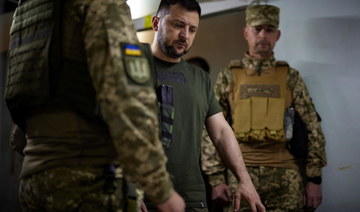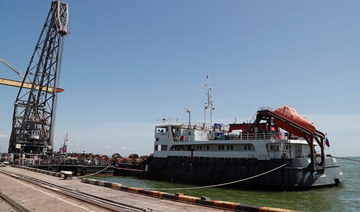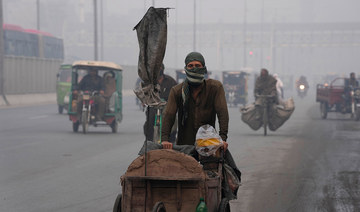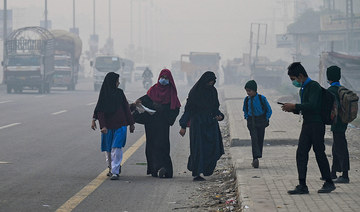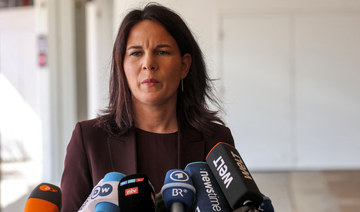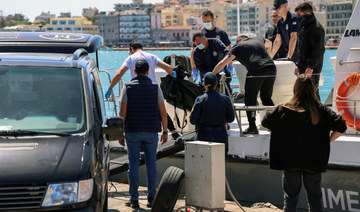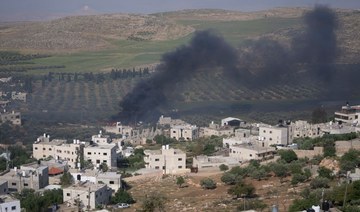BAKHMUT, Ukraine: Workers pulled scores of bodies from smashed buildings in an “endless caravan of death” inside the devastated city of Mariupol, authorities said Wednesday, while fears of a global food crisis escalated over Ukraine’s inability to export millions of tons of grain through its blockaded ports.
At the same time, Ukrainian and Russian forces battled fiercely for control of Sievierodonestk, a city that has emerged as central to Moscow’s grinding campaign to capture Ukraine’s eastern industrial heartland, known as the Donbas.
As the fighting dragged on, the human cost of the war continued to mount. In many of Mariupol’s buildings, workers are finding 50 to 100 bodies each, according to a mayoral aide in the Russian-held port city in the south.
Petro Andryushchenko said on the Telegram app that the bodies are being taken in an “endless caravan of death” to a morgue, landfills and other places. At least 21,000 Mariupol civilians were killed during the weeks-long Russian siege, Ukrainian authorities have estimated.
The consequences of the war are being felt far beyond Eastern Europe because shipments of Ukrainian grain are bottled up inside the country, driving up the price of food.
Ukraine, long known as the “bread basket of Europe,” is one of the world’s biggest exporters of wheat, corn and sunflower oil, but much of that flow has been halted by the war and a Russian blockade of Ukraine’s Black Sea coast. An estimated 22 million tons of grain remains in Ukraine. The failure to ship it out is endangering the food supply in many developing countries, especially in Africa.
Russia expressed support Wednesday for a UN plan to create a safe corridor at sea that would allow Ukraine to resume grain shipments. The plan, among other things, calls for Ukraine to remove mines from the waters near the Black Sea port of Odesa.
But Russia is insisting that it be allowed to check incoming vessels for weapons. And Ukraine has expressed fear that clearing the mines could enable Russia to attack the coast. Ukrainian officials said the Kremlin’s assurances that it wouldn’t do that cannot be trusted.
European Council President Charles Michel on Wednesday accused the Kremlin of “weaponizing food supplies and surrounding their actions with a web of lies, Soviet-style.”
While Russia, which is also a major supplier of grain to the rest of the world, has blamed the looming food crisis on Western sanctions against Moscow, the European Union heatedly denied that and said the blame rests with Russia itself for waging war against Ukraine.
“These are Russian ships and Russian missiles that are blocking the export of crops and grain,” Michel said. “Russian tanks, bombs and mines are preventing Ukraine from planting and harvesting.”
The West has exempted grain and other food from its sanctions against Russia, but the US and the EU have imposed sweeping punitive measures against Russian ships. Moscow argues that those restrictions make it impossible to use its ships to export grain, and also make other shipping companies reluctant to carry its product.
Turkey has sought to play a role in negotiating an end to the war and in brokering the resumption of grain shipments. Turkish Foreign Minister Mevlut Cavusoglu met on Wednesday with his Russian counterpart, Sergey Lavrov. Ukraine was not invited to the talks.
Meanwhile, Moscow’s troops continued their painstaking, inch-by-inch campaign for the Donbas region with heavy fighting in and around Sievierodonetsk, which had a prewar population of 100,000. It is one of the last cities yet to be taken by the Russians in Luhansk, one of the two provinces that make up the Donbas.
Ukrainian President Volodymyr Zelensky called Sievierodonetsk the “epicenter” of the battle for the Donbas.
“This is a very fierce battle, very hard, perhaps one of the most difficult of the entire war,” he said in his nightly video address, which was recorded in the street outside his office in Kyiv.
He said the Ukrainian army is defending its positions and inflicting real losses on the Russian forces.
“In many ways, it is there that the fate of our Donbas is being decided,” Zelensky said.
Luhansk Gov. Serhiy Haidai acknowledged the difficulties of battling Russian forces, saying, “Maybe we will have to retreat, but right now battles are ongoing in the city.”
“Everything the Russian army has — artillery, mortars, tanks, aviation — all of that, they’re using in Sievierodonetsk in order to wipe the city off the face of the Earth and capture it completely,” he said.
The city of Lysychansk, like Sievierodonetsk, is also wedged between Russian forces in Luhansk province. Valentyna Tsonkan, an elderly resident of Lysychansk, described the moment when her house came under attack.
“I was lying on my bed. The shrapnel hit the wall and went through my shoulder,” she said as she received treatment for her wounds.
Russia’s continuing encroachment could open up the possibility of a negotiated settlement between the two nations more than three months into the war, analysts said.
Russian President Vladimir Putin “has the option of declaring his objectives met at more or less any time in order to consolidate Russia’s territorial gains,” said Keir Giles, a Russia expert at the London think tank Chatham House. At that point, Giles said, Western leaders may “pressure Ukraine to accept their losses in order to bring an end to the fighting.”
Zelensky said Russia is unwilling to negotiate because it still feels strong.
Speaking by video link to US corporate leaders, he called for even tougher sanctions to weaken Russia economically, including getting it “off the global financial system completely.”
Zelensky said Ukraine is willing to negotiate “to find a way out.” But a settlement cannot come “at the expense of our independence.”
Meanwhile, to the north, Russian shelling of the Kharkiv region killed five people and wounded 12 over the past 24 hours, Ukrainian authorities said.
The Russian military said it used high-precision missiles to hit an armor repair plant near Kharkiv. There was no confirmation from Ukraine of such a plant being hit.
More bodies found in Mariupol as global food crisis looms
https://arab.news/wpdzx
More bodies found in Mariupol as global food crisis looms
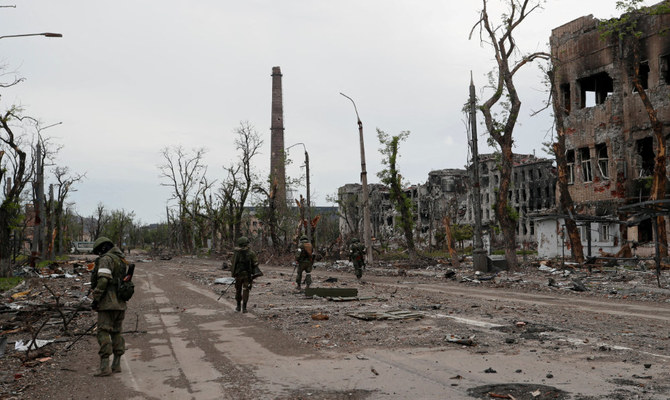
- The consequences of the war are being felt far beyond Eastern Europe because shipments of Ukrainian grain are bottled up inside the country, driving up the price of food
Finance firms urge ambitious action on plastic pollution

- Curtailing the estimated 400 million metric tonnes of waste produced every year is a crucial part of efforts to protect biodiversity, with microplastics found everywhere from the mountainous Himalayas to staple foods and even human blood
LONDON: A group of 160 financial companies on Friday urged governments to agree a treaty to end plastic pollution that would help spur private sector action, ahead of the next round of global talks in Canada.
The fourth meeting of the Intergovernmental Negotiating Committee on Plastic Pollution (INC-4) is due to be held in Ottawa next week to lay the groundwork for an eventual deal before the end of the year.
Curtailing the estimated 400 million metric tonnes of waste produced every year is a crucial part of efforts to protect biodiversity, with microplastics found everywhere from the mountainous Himalayas to staple foods and even human blood.
To help fix the problem, the finance firms, which include Britain’s biggest investor Legal & General Investment Management and Canadian pension investor CDPQ, called for a policy framework backed up by binding rules.
Among specific steps, the group called for the treaty to set an objective for all public and private finance to be consistent with the goal of eliminating plastic pollution, similar to that in the Paris climate agreement and the Kunming-Montreal global biodiversity framework.
It also called for companies to assess and disclose plastic-related risks and opportunities; clearer plastic-related policies and targets from governments in areas like waste creating and recycling; and for further private investment to be directed to ending plastic pollution.
“A clear transition pathway laid out in the Treaty will help leverage finance at scale for this massive task of ending plastic pollution worldwide,” said Anne-Sophie Castelnau, global head of sustainability at ING, one of the signatories.
Steve Hardman, CEO of Plastic Collective, an NGO which designed the world’s first plastic waste reduction bond alongside Citi and the World Bank, welcomed the support but called for business to provide more financial solutions.
In January, the World Bank issued the $100 million bond to finance plastic-reduction projects in Ghana and Indonesia. Investors will be paid a rate linked to plastic removal credits generated by
the projects.
Finnish PM: EU should help end migrant influx from Russia

- European Commission President Ursula von der Leyen visits the border to assess security situation
HELSINKI: The EU should take measures to help Finland stop an influx of migrants via Russia, Finnish Prime Minister Petteri Orpo said.
Finland last year shut its long border with Russia amid a growing number of arrivals from countries including Syria and Somalia.
It accused Moscow of weaponizing migration against the Nordic nation and the EU, an assertion the Kremlin denies.
Finland’s government has closed eight of its nine checkpoints with Russia.
The only one that remains open is dedicated to rail travel and cargo trains mainly run through it.
“We are preparing our legislation, but we also need EU measures,” Orpo said, without elaborating, after visiting the Nordic country’s border with European Commission President Ursula von der Leyen.
Von der Leyen told the same press conference that the EU Commission was working closely with the migrants’ countries of origin, agreeing with Finland’s position.
“What we see is that a state is instrumentalizing poor people to put pressure on another state, so that is a clear security issue,” she said.
She said that the measures taken to deal with migrants from Russia must balance protecting the security of borders and international obligations.
Following Poland and Lithuania’s example on their borders with Belarus, the Finnish government is drafting legislation allowing border guards to block asylum seekers entering the country from Russia.
“We all know how (Russian President Vladimir) Putin and his allies instrumentalize migrants to test our defenses and to try to destabilize us,” von der Leyen told officials.
“Now Putin is focusing on Finland, and this is no doubt in response to your firm support of Ukraine and your accession to NATO.”
Von der Leyen and Orpo flew in a Finnish helicopter over the landscape of forests and towns on the border.
Von der Leyen is campaigning as a conservative European People’s Party bloc member for a second term in office as head of the EU’s powerful executive branch.
Security is a top EPP theme before the June 6-9 European Parliament elections.
Most of the migrants hail from the Middle East and Africa.
Most of them have sought asylum in Finland, a member of the EU and NATO with a population of 5.6 million.
Finland joined NATO in April 2023, ending decades of neutrality after the country’s defeat by the Soviet Union in the Second World War.
In March, Sweden also became a member of the trans-Atlantic alliance.
The move dealt a major blow to Putin, with a historic realignment of Europe’s post-Cold War security landscape triggered by Moscow’s offensive against Ukraine.
US sanctions fundraisers for extremist West Bank settlers who commit violence against Palestinians
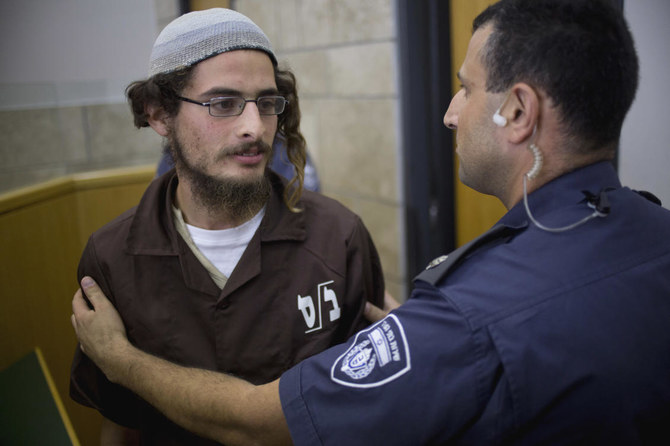
- Move comes as West Bank sees some of its worst violence perpetrated by settlers against Palestinians since Gaza war
WASHINGTON: The Biden administration on Friday imposed sanctions on two entities accused of fundraising for extremist Israel settlers already sanctioned, as well as the founder of an organization whose members regularly assault Palestinians.
The Treasury Department announcement comes as the West Bank has seen some of its worst violence perpetrated by extremist settlers against Palestinians since the war in nearby Gaza began.
There is also friction between President Joe Biden and Israeli Prime Minister Benjamin Netanyahu, whose far-right government has reacted angrily to previous sanctions imposed against West Bank settlers.
Included in the Friday sanctions are two entities — Mount Hebron Fund and Shlom Asiraich — accused of raising funds for sanctioned settlers Yinon Levi and David Chai Chasdai.
Both men were previously sanctioned by the Biden administration for violently attacking Palestinians in the West Bank.
The penalties aim to block them from using the US financial system and bar American citizens from dealing with them.
The fundraising campaign established by Mount Hebron Fund for Levi and by Shlom Asiraich for Chasdai generated the equivalent of $140,000 and $31,000, respectively, according to US Treasury.
In Levi’s case, the fund now sanctioned by the Biden administration is linked to the regional council in the area, a body that receives state money. The Biden order Friday stopped short of sanctioning the council itself.
Rights groups say that the expansion of illegal settler outposts in the West Bank is enthusiastically supported by the regional councils and nudged along by Israel’s current national government — the most far-right in the country’s history.
The Biden order also skirted sanctioning crowdfunding websites where funds were raised, GiveChak and New York-based Charidy.
In Chasdai’s case, the fundraiser on Charidy was organized by Shlom Asiraich, which raises money for imprisoned Jewish extremists.
Both online fundraisers have now been taken down. But at least one fundraiser linked to a settler previously sanctioned by the Biden administration, Moshe Sharvit, remains online. As of Friday, the page on GiveChak had raised the equivalent of over $879,000.
Additionally, the State Department is designating Ben-Zion Gopstein, the founder and leader of Lehava, an organization whose members have assaulted Palestinian civilians.
Treasury Deputy Secretary Wally Adeyemo said the organizations “undermine the peace, security, and stability of the West Bank. We will continue to use our tools to hold those responsible accountable.”
In February, Biden issued an executive order that targets Israeli settlers in the West Bank who have been accused of attacking Palestinians and Israeli peace activists in the occupied territory.
Hindu-Muslim divisions sway voting in Indian district scarred by deadly riots

- Villages are largely self-segregated by religion in and around Muzaffarnagar in the most populous Uttar Pradesh state
- Violent clashes broke out in 2013 after two Hindus stabbed Muslim youth to death, accusing him of harassing their sister
MUZAFFARNAGAR: Hindu-Muslim enmity made way for peace in an Indian district that saw deadly riots a decade ago but religious divisions still influence residents who voted on Friday in general elections in which Hindu nationalism is a key theme.
Villages are largely self-segregated by religion in and around Muzaffarnagar district, in the most populous northern state of Uttar Pradesh, but people say there is no longer tension between the majority Hindu and minority Muslim communities.
Violent clashes broke out here in 2013 after two Hindus stabbed a Muslim youth to death, accusing him of sexually harassing their sister. They were later beaten to death by a Muslim mob, which sparked riots that killed about 65 people, mostly Muslims, and displaced thousands.
Violence has not returned to the district known as the country's sugarcane-belt, but political divisions remain as Hindus typically vote for Prime Minister Narendra Modi's Bharatiya Janata Party (BJP) and Muslims for the opposition.
Modi's government has "controlled Muslims", said Ramesh Chand, a Hindu biscuit baker in Kairana city near Muzaffarnagar.
Critics accuse the nationalist BJP of targeting India's 200 million minority Muslims to please their hardline Hindu base - charges they deny.
Modi is widely expected to win a third term on the back of strong growth, welfare and his personal popularity despite some concern about unemployment, price rises and rural distress.
Chand said Modi had improved security in the region. "We can live in peace, whether or not we have jobs ... We can sleep with our doors open."
There were opposing views too.
In Jaula village, sugarcane farmer Mohammed Irfan, 50, said Modi's "high-handedness against Muslims" as well as unemployment and inflation were major reasons for him voting for the opposition Samajwadi Party.
Uttar Pradesh elects 80 lawmakers to the 543-member lower house of parliament, the most among all states, and a strong showing here is critical to the nationwide outcome.
Support for Modi was visible in Kutba Kutbi village, the epicentre of the 2013 riots.
Although there is "brotherhood" between the two communities now, nearly all Muslim families left the village after the riots, said Vinay Kumar Baliyan, 43, a farmer who said he supports Modi for promoting economic growth and raising India's stature globally.
But Irfan said Muslims are expected to vote in larger numbers this time as Eid celebrations this month brought many migrant workers and students home.
After Pakistan alert, WHO likely to issue wider warning on contaminated J&J cough syrup

- The UN health body said it puts out global medical product alerts to ‘encourage diligence’ by authorities
- The WHO this week sent out alert on five batches of contaminated cough syrup ingredients found in Pakistan
LONDON: The World Health Organization is likely to issue a wider warning about contaminated Johnson and Johnson-made children’s cough syrup found in Nigeria last week, it said in an email.
Nigeria’s regulator recalled a batch of Benylin paediatric syrup last Wednesday, having found a high level of diethylene glycol in the product during routine testing.
The contaminant, alongside another closely related toxin, ethylene glycol, has been linked to the deaths of more than 300 children in Cameroon, Gambia, Indonesia and Uzbekistan since 2022, though there is no evidence that these incidents are linked with the latest recalls.
The UN health body said it puts out global medical product alerts to “encourage diligence” by national authorities and was likely to do so in this instance, “subject to confirmation of certain details from parties.”
The recalled batch of Benylin syrup was made by J&J in South Africa in May 2021, although Kenvue now owns the brand after a spin-off from J&J last year.
J&J has referred requests for comment to Kenvue. In an emailed statement on Friday, Kenvue said it had carried out tests on the batch recalled by Nigeria and had not detected either diethylene or ethylene glycol.
“We continue to work closely with health authorities and the WHO and are engaging with NAFDAC to understand their test results, including verifying the authenticity of the sampled product, the testing methodology used, and results reported by the agency,” the statement added.
Since Nigeria’s recall, five other African countries have also pulled the product from shelves — Kenya, Rwanda, Tanzania, Zimbabwe and South Africa, where the drug was made.
South Africa’s regulator has also recalled another batch of the syrup, which is used to treat coughs, hay fever and other allergic reactions in children.
Diethylene glycol is toxic to humans when consumed and can result in acute kidney failure, although there have been no reports of harm in the latest incident.
RAW MATERIALS
In the 2022 cases, the contamination in the syrups came from the raw materials used by manufacturers in India and Indonesia.
The WHO said it was collaborating with both the manufacturer and regulatory authority in South Africa to investigate the Benylin paediatric syrup, and had information on the source of the ingredients used. Kenvue has previously said it tested its ingredients before manufacture.
The agency said the possibility that the syrup was counterfeit was also “under consideration as part of investigations.”
Earlier this week the WHO sent out a separate alert on five batches of contaminated cough syrup ingredients found in Pakistan that appeared to have been falsely labelled as Dow Chemical products.
It was the first alert the WHO has sent on excipients — elements of a medicine other than the active pharmaceutical ingredient — rather than finished products, the agency confirmed on Friday.
The batches of propylene glycol were contaminated with ethylene glycol.
“It was critical for WHO to also alert manufacturers that may have been procuring this material to exercise more caution,” a WHO spokesperson said by email.
Propylene glycol is not an ingredient in Benylin paediatric syrup, a Kenvue spokesperson said on Friday.



